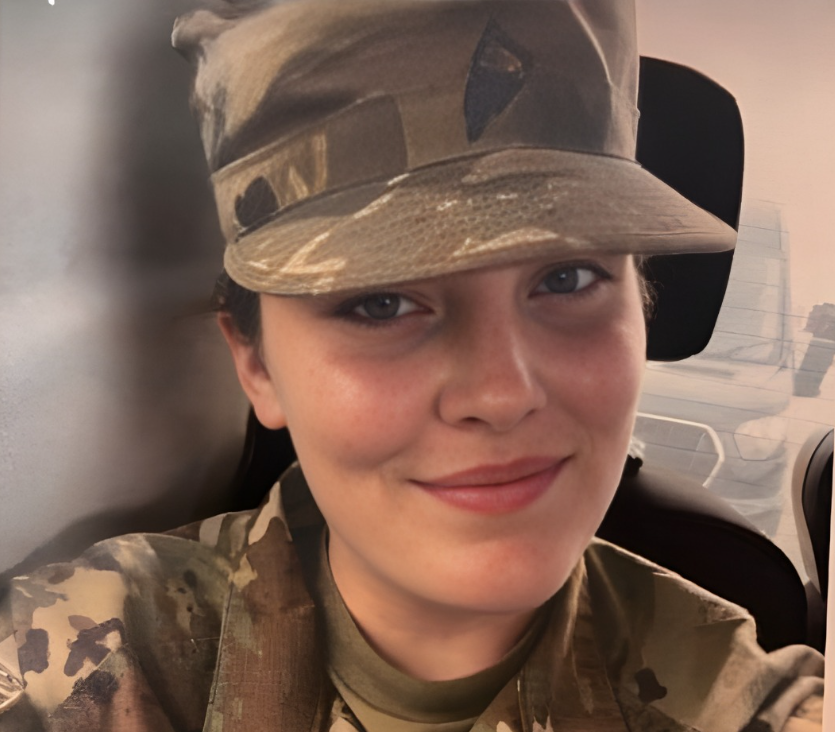The night in Washington carried a strange calm, the kind that feels almost unnatural in a city that rarely sleeps. Twenty-year-old Sarah Beckstrom marched with steady steps along her assigned patrol route near the White House. The November air was cold enough to sting her cheeks, yet she felt alive, anchored by the weight of her uniform and the purpose she believed in so deeply. Every time she glanced at the glowing white structure in the distance, she remembered why she had joined the National Guard — to serve, to protect, to be part of something greater than herself.
Her partner that night, the 24-year-old Andrew Wolfe, laughed at a joke Sarah had just made. The sound echoed softly between the quiet buildings. They had been working together only a short time, but already had a familiar rhythm — shared humor, quick instincts, mutual trust. They had plans for the next morning: a simple breakfast before their shift, maybe even a quick photo near one of the monuments, “for memories,” Andrew had said with a grin.
But peace, Sarah knew, could be fragile — and sometimes it shattered without warning.
A faint movement in a nearby alley caught her attention. Her instincts sharpened instantly. She placed her hand near her radio, her breath slowing as her senses tuned in. For someone so new to service, she had a natural ability to feel when something was off.
Then it happened.
The first gunshot tore through the air like a blade of lightning, ripping apart the calm night. The impact hit her hard, sending a shock through her body, but she reacted with raw training and instinct. She turned toward Andrew, grabbing him and trying to pull him behind the patrol vehicle for cover. Then more shots — rapid, merciless, echoing against the pavement.
Time twisted strangely. Everything slowed down, like the world had suddenly been submerged in water.
“Andrew…” she whispered, fighting to keep her voice steady as she felt warmth spreading across her uniform.
In those brief, fragile seconds, her mind drifted to the people who shaped her life. She thought of her father, who had hugged her fiercely the day she shipped out. Her mother, who always made sure her uniform looked perfect. Her friends back home, who teased her for being “the responsible one.” Her future — school, travel, dreams that had seemed so close, only hours earlier.
Sirens began to wail somewhere in the distance, growing louder. Lights flashed — blue, then red. Shadows moved frantically as fellow Guardsmen and officers rushed toward them. Voices shouted commands, called for medics, urged her to stay awake.
“Stay with us, Sarah. Stay with us. You’re gonna be okay!” someone pleaded as hands pressed around her, trying to stop the bleeding.
She tried to smile — a small, brave attempt. She didn’t know if anyone saw it.
In the days that followed, Washington became heavier, quieter, as if the city itself was mourning. News spread quickly: Sarah Beckstrom, the young National Guard member wounded in the ambush, had passed away. For many, her name became a symbol of a different kind of heroism — not loud, not decorated, but steady and sincere. The kind found in ordinary people who choose extraordinary responsibility.
Her fellow Guardsmen spoke about her determination, her kindness, the way she always encouraged everyone around her. Civilians left flowers at the site of the shooting. Messages poured in from across the country — from strangers who had never met her, but who understood the weight of her sacrifice.
Andrew, recovering slowly, spoke softly about her when he could:
“She was brave even in the worst moment. She didn’t think of herself first — she tried to protect me.”
Her family grieved deeply, yet found pride in the daughter they had raised. They said she had lived with a sense of duty and hope that touched everyone who knew her. Her name began to echo beyond her own circle — in newspapers, in conversations, in discussions about safety, service, and sacrifice.
Though her time was short, Sarah Beckstrom’s story left a lasting imprint.
She became a reminder that the people who stand watch over cities — often unnoticed, often uncelebrated — carry burdens most never see. And sometimes, they give everything.
Her final watch was a moment of courage, of instinct, of love for her partner in the field and for the mission she believed in.
Her legacy lived in the hearts she touched, in the uniforms that stood saluting her, and in a city she tried to keep safe — even in her final breath.
